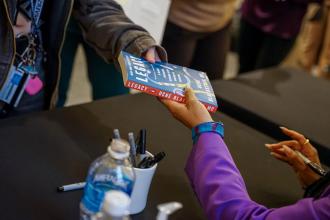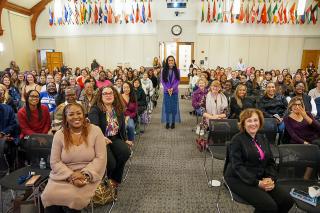Simmons University hosted its fall community read on October 22, 2025, with guest speaker Dr. Uché Blackstock, author of Legacy: A Black Physician Reckons with Racism in Medicine (Viking-Penguin Random House, 2024). This event was co-sponsored by the Division of Student Engagement, Success, and Diversity; the Provost’s Office; the University Library; the Office of Advancement; and the Dotson Bridge and Mentoring Program. Generous funding from Eileen Friars ’72 also helped make the event possible.
“Legacy is a generational memoir that explores Blackstock’s career in medicine and disparities in healthcare access and quality of care in the United States,” said Vice President of Student Success and Diversity Dr. Nakeisha Cody, during her introduction to the Community Read.
Blackstock is the Founder and CEO of Advancing Health Equity, which, since 2019, has helped “drive measurable change in health outcomes by embedding equity into leadership, strategy, and clinical practice,” Cody said.
Blackstock makes regular appearances on MSNBC and NBC News and has published numerous articles and op-eds that address issues in healthcare. She is a former associate professor in the Department of Emergency Medicine and the former faculty director of the Office of Diversity Affairs at New York University’s School of Medicine.
A Trailblazing Mother
Assuming the podium, Blackstock began by showing members of the audience a 1978 photograph of herself, her twin sister Oni, and her mother, Dr. Dale Gloria Blackstock, which was taken during the girls’ baptism. “I like having this picture when I give talks, because it makes me feel like she [my mother] is looking down on me,” she said.
Her mother had grown up in poverty and on public assistance when she beat the odds and became a prominent physician in her Brooklyn community. Growing up in the 1980s, Blackstock remembers how her mother was beloved by her patients. She also observed how her mother intently listened to her patients and treated them with kindness and warmth.
“When I was growing up, I thought all physicians were Black women, like my mom,” said Blackstock, who used to spend time at the public hospital where her mother worked. Dr. Blackstock and her sister, Dr. Oni Blackstock, are the first Black mother-daughter legacy at Harvard Medical School.
“Our mother was our role model; we wanted to be just like her … [but] it’s important to understand that she was a rarity.”
Blackstock’s mother died an untimely death at the age of 47, due to acute myelogenous leukemia, though her memory continues to inspire her daughters.
Systemic Inequities in Health Care
In an interactive lecture, Blackstock proceeded to examine reasons for the low percentage of Black physicians in the US. Although Black individuals make up 13% of the overall US population, only 5.4% of them are acting physicians.
Addressing this disparity, Blackstock turned to the history of HBCUs (historically Black colleges and universities). “For hundreds of years, there were racist practices and policies that kept Black people out of medical school,” she said, citing the aftermath of the Civil War and Reconstruction as eras when Black individuals finally entered medical schools. In time, seven HBCUs had medical schools. “So, what happened?” she asked.
Blackstock referenced the White educator Abraham Flexner (1866–1959) and his 1910 Flexner report. Essentially, Flexner was tasked by the American Medical Association and the Carnegie Foundation to review every medical school in the United States and compare them to the gold standard, embodied by Johns Hopkins University.
Blackstock noted that Flexner found Black people inferior, and his report effectively closed five HBCU medical schools. These schools, Blackstock noted, “had smaller endowments and a lack of resources due to the legacy of slavery and systemic racism.” Blackstock adds that if these institutions had remained open, they would have trained between 25,000 and 35,000 Black physicians.
That disparity has had a considerable impact on patient care. Blackstock emphasized the need for patients to have doctors who make them feel seen and heard. “When you talk about racial concordance in patient care — meaning when the clinician and the patient are from the same racial background — it actually matters for patients of color,” she said. With this relationship, patients of color are more likely to follow doctors’ recommendations, get vaccinated, and adhere to treatment plans.
Racism in Medicine

During her Harvard Medical School education, Blackstock was rarely taught about the racist history of medicine in the US. After working in emergency room medicine at a public hospital as well as an academic setting, she began to uncover how many medical discoveries involved harming Black individuals. “It took my journey from child to student to medical practitioner to discover the truth,” she said.
For example, while in medical school, Blackstock learned about the “HeLa” cells, named after Black woman Henrietta Lacks (1920–1951). Lacks had complained of pain and vaginal bleeding and went to Johns Hopkins for treatment. Her “immortal” cells kept replicating due to a tumor in her cervix, and for years her cells were used by biomedical and pharmaceutical companies without her knowledge or consent.
Blackstock also discussed J. Marion Sims (1813–1883), the so-called father of modern gynecology. While he made important discoveries and innovations, including surgical techniques and the speculum, he conducted horrifying experiments on enslaved Black women Anarcha, Lucy, and Betsey. Blackstock also noted that his experiments had a sinister incentive, as they could serve to facilitate Black women’s ability to give birth, and therefore perpetuate enslavement.
Referencing more recent instances of medicalized racism, Blackstock explained how standard tests for measuring kidney function have assigned different “normal” ranges for African Americans. This practice has delayed referrals to specialty care and de-prioritized Black patients on kidney transplant lists.
Furthermore, sickle cell disease has been inaccurately considered a “Black” disease, and, as such, has not received the same research funding and attention compared to other diseases. “Since people [with sickle cell disease] are not receiving the proper preventative care, they end up in the ER … there can be many complications, and if not treated [soon enough] they can actually die,” Blackstock explained.
Acknowledge and Repair
“So how do we reconcile … the horror of racism with the discoveries that benefit everybody?” Blackstock asked. “We need to acknowledge [history], and also contemplate what repair looks like.”
Blackstock saw the truth of health inequity when going from medical student to resident. “And once I saw the truth, I couldn’t unsee it,” she said.
“Carrying on my mother’s legacy, I started speaking publicly about health equity about five years ago,” she said. “I did not know where that journey would take me, but I now see it as my legacy.” She sees her book as something that would have benefited her younger self. “I wish I could have read this when I was 18 years old.”
One strategy Dr. Blackstock recommends is for clinicians to practice humility. “As a clinician, you should approach your patient or client from a position of humility, and realize that they are the expert on their bodies.”
During the COVID-19 pandemic, Blackstock observed that racist and structural inequities were cast in relief. She realized that she had a voice, and began writing op-eds and appearing on the news. “I was able to speak truth to power, and I saw that it created real change.” For instance, legislators who read her article and saw her on television generated pandemic-related policies that supported marginalized communities.
“I now do work that aligns with my purpose, mission, and values,” Blackstock said. “However tragic or chaotic this current moment feels, it can be the opportunity for transformational change … When I think about health equity, which is the potential for everybody to live to their best potential, this is really about quality care and access for everybody.”
Advice to Future Leaders
Addressing Simmons students, Blackstock said, “I want you to think about what role you will have [in society] … you are the future leaders. What is the impact that you want to make?” It is imperative, she said, to “turn knowledge into action.”
While Blackstock conceded that every individual’s path is different, “Legacy is for everyone,” she said. “It’s about finding your purpose and being part of the change.”

